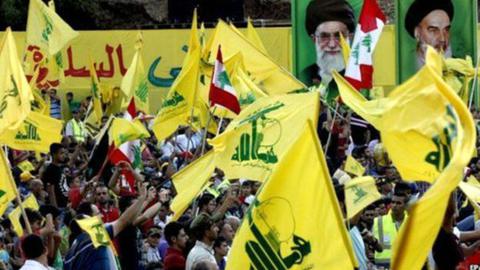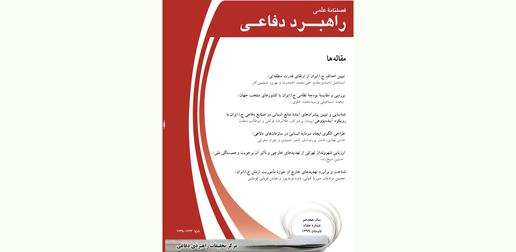A new report has found that Iran's support for militias in the Middle East, including in Syria, Palestine and Iraq, produces negligible economic benefits, indicating that Iran's interference in these countries is primarily an ideological pursuit and a project to enhance Iran's influence and sense of military dominance.
The report, published by the Strategic Defense Science Quarterly, which is affiliated with the National Defense University military university in Iran, looks at the Islamic Republic’s support of militias and military groups in the Middle East, outlining the reasons for and goals of these policies, as well as their history. It names three specific goals: “deterrence," "legitimate defense" and "comprehensive defense," and outlines the Islamic Republic's plans to upgrade its regional power in line with these goals.
The Strategic Defense Science Quarterly interviewed 57 senior military and national officials for the report, asking for their views on the Iranian regime’s controversial policy of supporting militia operations in the region. Many of them state that upgrading the regional powers of the Islamic Republic will lead to an enormous increase in strategic influence, military might, power for popular mobilization and strategic management.
The report explicitly states that the Islamic Republic sees its support of Hezbollah in Lebanon, Hamas in Palestine, Syria's Popular Resistance Forces, Hashad al-Shaabi in Iraq, Afghanistan's Fatemiyoun Brigade, Zainebiyoun in Pakistan, and Yemen's Ansarollah as an effective tool to promote its regional powers.
It also looks at the economic, cultural and social achievements of promoting this power, though it acknowledges that these achievements are lower-ranking than the political and national security gains made.
Only 23 percent of the experts the report consulted said that improving Iran’s regional power could lead to an increase in the republic’s exploitation of economic potential in the region.
On the other hand, 89 percent said that the policy of building power in the region will greatly increase Iran’s own military capabilities.
Among other things, the report concludes that Lebanese Hezbollah forces have the most important role in enhancing Iran’s regional power, followed by Hamas, the Syrian People's Resistance Forces, Hashad al-Sha'abi, the Fatemiyoun Brigade, Zainebiyoun and Ansarollah.
The publication also looks at the emphasis the Islamic Republic places on strengthening and expanding the "Shia Crescent” — the sphere of Shia Muslims’ power and influence in the region. The crescent currently spans large parts of India, Pakistan, the majority of Iraq and Bahrain, eastern Saudi Arabia, and key areas of Turkey, Lebanon, Syria, and Africa, as well as Iran.
The Supreme Leader's Commitment to Proxy Wars
The official website of Supreme Leader Ayatollah Ali Khamenei features a dedicated section entitled Resistance, which deals with the implementation of this policy, and which was originally launched in 2013.
The overall function of the website is to publish, review and analyze the Supreme Leader’s speeches, and the Resistance section is also prominent. The website also features a map of the countries in which the Islamic Republic has vast plans to intervene and to support its affiliated militias.
In recent years, Khamenei himself has repeatedly and explicitly stated that he supports militant groups in the region, and that that support will continue.
So far, reliable statistics and documentation of 40 years of Iran’s financial assistance to these militant groups have not been published. However, the amount of support has been such that over the years, these militant groups have become stronger than ever.
Iran has helped organize, equip and fund Afghan, Pakistani, Iraqi and Syrian militias over the last five years, and that has led to armed groups opposed to the central governments of Iraq and Syria being driven back. It has also encouraged the Islamic Republic to expand its support for these groups.
This support, an important part of which is financial, has led to widespread criticism and protests in Iran, with people commenting on the policy, its impact, and its damage on a daily basis online and, before the coronavirus pandemic, in meetings and gatherings. The Islamic Republic has paid little or no attention to such protests and objections. In fact, it has tended, if anything, to physically suppress such expressions.
In addition to outlining the foundation of and motivation for the Islamic Republic’s policies for militias outside Iran, the recent report also addresses the future of them, and suggests strategies for how the regime can better provide support. This includes increasing economic and technical support, as well as launching media (propaganda) campaigns, all in the service of strengthening the "axis of resistance."
The expansion of Iran’s support for militias in the region is undoubtedly a huge financial burden, with very little economic gain for Iran and Iranians. Furthermore, in a climate of deep economic deprivation and entrenched dissatisfaction with government policies regarding everything from social and health care to religious freedom — all of it amplified and made worse by the current pandemic — an outline to expand support for militant groups is unlikely to be welcomed by most Iranians. Regardless, officials of the Islamic Republic continue to use money that ultimately belongs to the Iranian people to achieve their ideological ambitions.
visit the accountability section
In this section of Iran Wire, you can contact the officials and launch your campaign for various problems


























comments